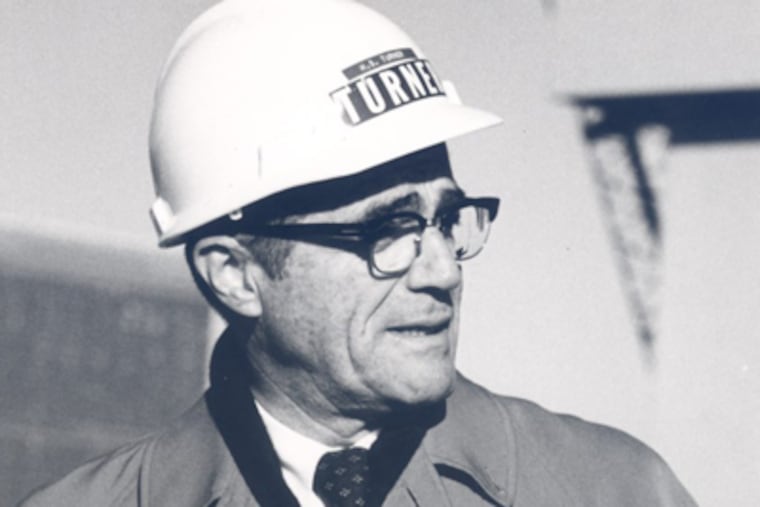Howard S. Turner, 100; ran family construction firm
Howard S. Turner, 100, who pursued a career in research and development before helping to lead his family firm, Turner Construction Co., from 1965 to 1982, died Wednesday, April 25, at Bryn Mawr Hospital. He had lived at Dunwoody Village, the retirement community in Newtown Square, since 1986. Christopher McFadden, a Turner Construction spokesman, said Tuesday that “under his leadership, the company grew from seven offices in the United States to operations in 20 cities ... and the company’s international division was launched with operations in four countries.

Howard S. Turner, 100, who pursued a career in research and development before helping to lead his family firm, Turner Construction Co., from 1965 to 1982, died Wednesday, April 25, at Bryn Mawr Hospital. He had lived at Dunwoody Village, the retirement community in Newtown Square, since 1986.
Christopher McFadden, a Turner Construction spokesman, said Tuesday that "under his leadership, the company grew from seven offices in the United States to operations in 20 cities ... and the company's international division was launched with operations in four countries.
"The company's sales grew from $591 million in 1965 to $1.7 billion by 1978," not adjusting for inflation, he said.
Peter Davoren, president and chief executive officer of Turner, said in a Tuesday statement: "As our company prepares to celebrate its 110th anniversary, we honor Howard for his leadership, integrity, and for his valued friendship and mentorship. Howard will be missed by all that knew him."
Daughter Holly Turner said in a Tuesday interview that her father's firm "always prided itself on the way in which it operates with the Quaker values of integrity and honesty. ...
"One of his key contributions to the construction industry was systematizing" work flow, she said. "He always wanted more precise information ... and that changed the way that Turner operated."
Mr. Turner also had a taste for adventure.
In the 1970s, while in South Africa on business, she said, "he went down into a diamond mine ... because he wanted to. He was thrilled that he had the opportunity to do that."
At 82, he was a passenger on a Russian icebreaker that headed toward the North Pole. "The company of men on the ship were all scientists in various fields in study of the North," she said.
"He was just a very curious man. A lot of intellectual curiosity."
Born in Jenkintown, Mr. Turner earned a bachelor's degree in chemistry at Swarthmore College in 1933, where he was elected to Phi Beta Kappa. He earned a doctorate in organic chemistry at the Massachusetts Institute of Technology in 1936.
Mr. Turner began his career as a research chemist with the DuPont Co. in Wilmington, where, during World War II, he worked on developing nylon for parachutes, food packages, and other uses.
He went to Pittsburgh to join the Pittsburgh Consolidation Coal Co. as assistant director of research and development in 1947 and became director in 1948. He was vice president for research and development at Jones & Laughlin Steel Corp. from 1954 to 1965.
When he moved to the coal company, his daughter said, "they took a chance on him."
Mr. Turner "was hired to create" a research and development operation, she said. At DuPont, "he was a line chemist, not even a manager," she said. But at the coal firm, "he had to go out and find the space and hire everybody. It was ground up."
Having become a director at Turner Construction in 1952, Mr. Turner turned his full attention to the family firm in 1965, being its president until 1968, its president and CEO until 1971, and its board chairman and CEO until 1977.
He retained the title of board chairman in 1978, and from 1978 until his retirement in 1982 was chairman of the Turner executive committee.
McFadden, the Turner spokesman, wrote in an e-mail that under Mr. Turner's leadership the company worked on such landmark projects as Madison Square Garden and the John Fitzgerald Kennedy Library in Boston.
In the Philadelphia region, during Mr. Turner's time, the firm was responsible, among several projects, for the 1966 construction of a freshman dormitory at Lafayette College in 1967, the Dana and Hallowell dormitories at Swarthmore, a six-story building at the Tasty Baking Co. plant in Philadelphia in the same year, and in 1977 the new headquarters of the Federal Reserve Bank of Philadelphia.
In 1966, he was in a delegation that went to South Vietnam to report on health, education, and agriculture development for President Lyndon B. Johnson. In 1983, he was elected to the National Academy of Engineering.
Mr. Turner was a director or trustee of several firms, among them Jones & Laughlin Steel and Dime Savings Bank of New York. He was on the board of managers of Swarthmore and a member of the advisory board of the Center for Policy Alternatives at MIT, among other positions.
In retirement, he still assumed responsibility. In 1992 as a resident of Dunwoody Village, Mr. Turner was elected to the board of trustees of Dunwoody Corp.
Besides his daughter, Mr. Turner is survived by daughters Susan and Barbara Jean, seven grandchildren, and four great-grandchildren. His wife, Katharine, died in 2003.
A memorial was set for 3 p.m. Wednesday, May 2, at the auditorium at Dunwoody Village, 3500 West Chester Pike, Newtown Square, for friends and associates from Dunwoody, with a service for family and friends set for noon Saturday, May 5, at Swarthmore Friends Meeting House, 12 Whittier Place on the Swarthmore College campus.
Contact Walter F. Naedele at 215-854-5607 or wnaedele@phillynews.com.